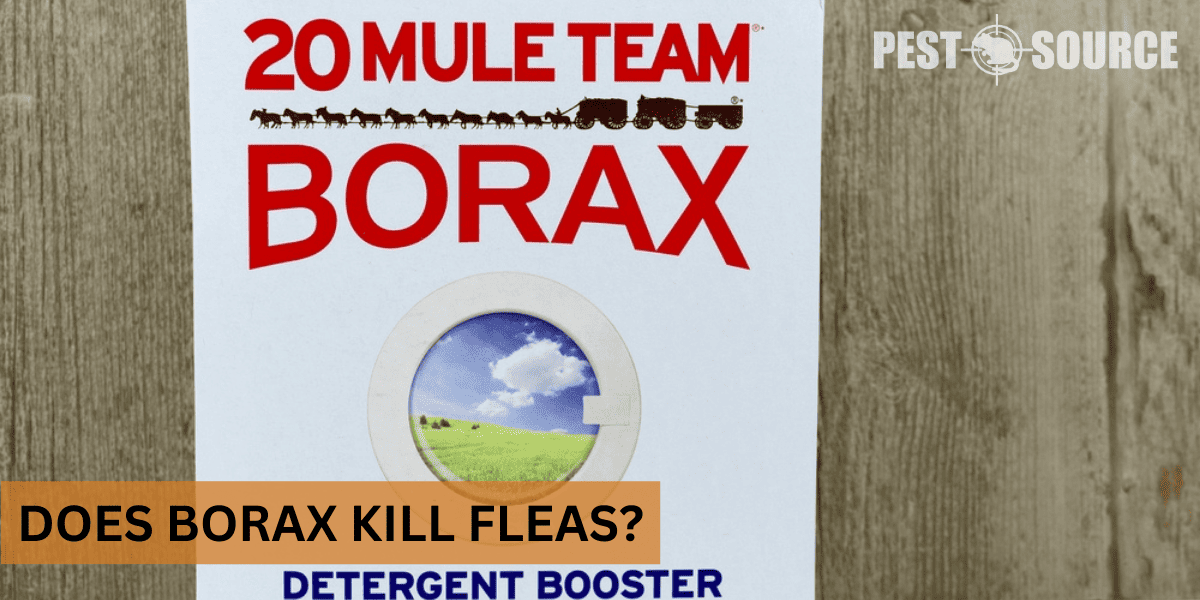Fleas are a common and unpleasant problem that can infest your home and pets, causing discomfort and health issues. While various flea control methods are available, finding an effective and safe solution can be challenging. One natural and popular option is borax, a mineral compound that can help combat flea infestations in various environments.
In this article, we’ll explore the effectiveness of borax in flea control, its safety around pets, how to use it in different situations, and other factors to consider when deciding if borax is the best flea control option for you.
POINTS
- Borax is an effective natural solution for flea control, working by dehydrating fleas through damaging their exoskeleton and causing their death.
- While it is useful in killing adult fleas and larvae, borax may not be as effective against flea eggs, so using it in combination with other treatments can increase its efficiency.
- Borax can be applied to various surfaces in your home, such as carpets and hardwood floors, but it is not recommended for direct application on pets.
- To ensure the safety of your pets during flea treatment, keep them away from treated areas, follow the proper application methods, and consult with a veterinarian for pet-specific flea treatment options.
- Combining borax with other methods, such as boric acid or diatomaceous earth, can improve the overall effectiveness of flea control, providing a more comprehensive solution for eliminating fleas in various life stages.
What is the Effectiveness of Borax in Flea Control?
What is borax?

Borax, also known as sodium borate, is a naturally occurring mineral compound that consists of boron, sodium, oxygen, and water. It has a wide range of uses, including household cleaning, laundry detergent booster, and as an insecticide for pests like fleas. Borax works as a desiccant, meaning it is effective at killing certain pests by damaging their exoskeleton and causing dehydration.
Does borax kill fleas?
Yes, borax is an effective solution for killing fleas. Borax, also known as sodium borate, is a natural mineral compound that has been used as a cleaning agent and insecticide for many years. It kills fleas by dehydrating their exoskeleton, which eventually leads to their death.
How does borax kill fleas?
Borax kills fleas by damaging their outer protective layer, known as the exoskeleton. This protective layer is essential for fleas to retain moisture within their bodies. When borax comes in contact with a flea, it absorbs the essential oils from the flea’s exoskeleton, causing severe dehydration. As a result, the flea eventually dies due to lack of moisture.

Will borax kill flea eggs and larvae?
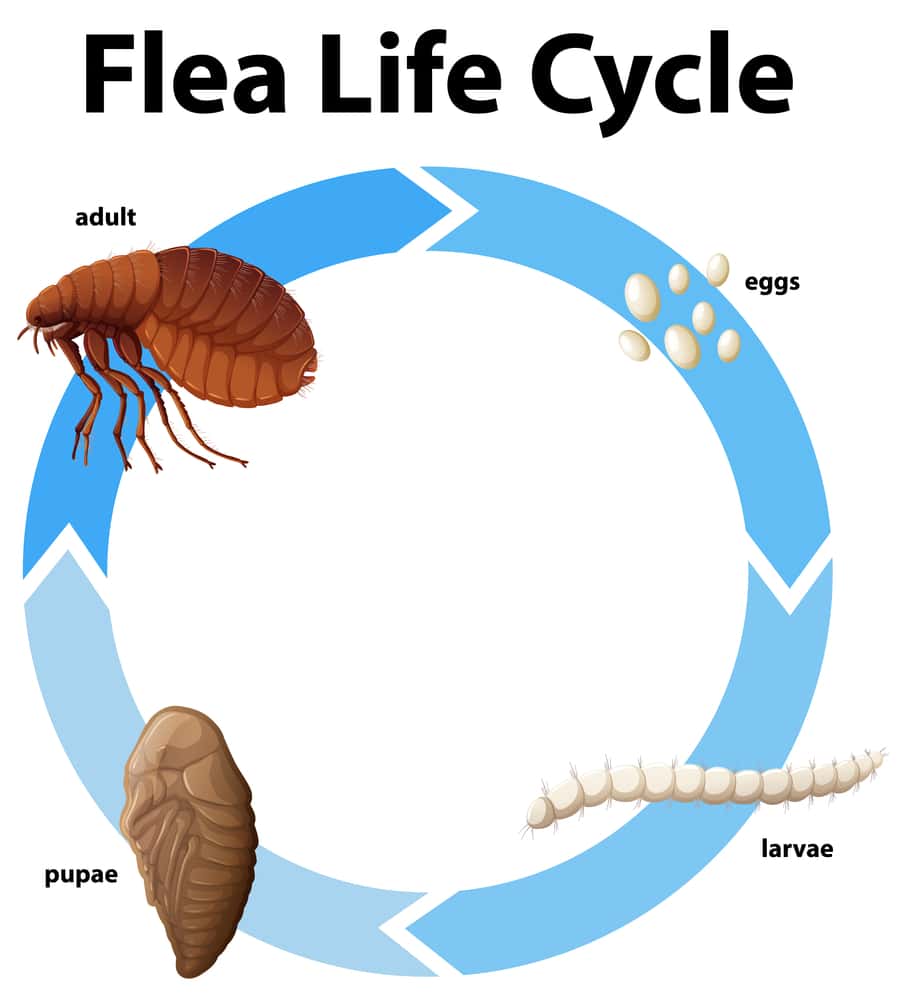
Borax is effective at killing adult fleas and flea larvae but may not be as effective in killing flea eggs. Flea eggs have a resilient outer layer that makes it more difficult for the borax to penetrate and cause dehydration. However, when borax is applied correctly, it can still help reduce the overall flea population and prevent them from reaching adulthood.
How long does it take for borax to kill fleas?
The time it takes for borax to kill fleas can vary depending on the size of the infestation, the life stages of the fleas, and the environment. Below, we outline how long it generally takes for borax to start showing results in the fight against fleas, from initial application to the complete elimination of an infestation.
| Hours After Application | Expected Outcome |
|---|---|
| Within a Few Hours | Begins killing fleas upon contact. |
| 24-48 Hours | Significant reduction in live flea population. |
| 1-2 Weeks | Complete elimination of infestation may require repeated treatments and thorough cleaning. |
It is essential to follow the proper application method and repeat the treatment if necessary.
Is borax a complete solution for fleas, or is it more effective when used in conjunction with other chemicals?
While borax can be an effective solution for flea control, using it in conjunction with other chemicals or treatments can increase its efficiency. For instance, combining borax with boric acid, diatomaceous earth, or insect growth regulators can provide a more comprehensive solution for flea control. Each of these methods targets different life stages of fleas, helping to eliminate an infestation more quickly and thoroughly.

Why might borax not be killing fleas in certain instances?
There could be several reasons why borax may not be killing fleas in certain instances. It might be due to:
- Improper application: Ensure even and thorough application across infested areas.
- Insufficient Quantity: Use the recommended amount; more may be needed for severe infestations.
- Flea Resistance: Combine borax with other flea control methods or consult a professional.
In case borax fails to eliminate an infestation, consider trying a different treatment method or consulting with a professional pest control expert.
How to Use Borax for Flea Control in Different Environments?
Borax can be a versatile tool in the fight against fleas, suitable for various environments within your home. The following table details how to effectively apply borax in different settings, ensuring the safety and cleanliness of each area.
| Environment | Application Steps | Duration |
|---|---|---|
| Carpets | Vacuum, sprinkle, work into fibers, let sit, vacuum again. | 24-48 hours |
| Hardwood Floors | Sweep, sprinkle, gently work into crevices, let sit, sweep/vacuum. | 24 hours |
| Upholstered Furniture | Test for colorfastness, apply lightly, use a brush to distribute, vacuum thoroughly. | 24-48 hours |
| Pet Bedding | Wash if possible, sprinkle borax, let sit, vacuum or wash out. | 24 hours |
How to use borax for killing fleas in carpets?
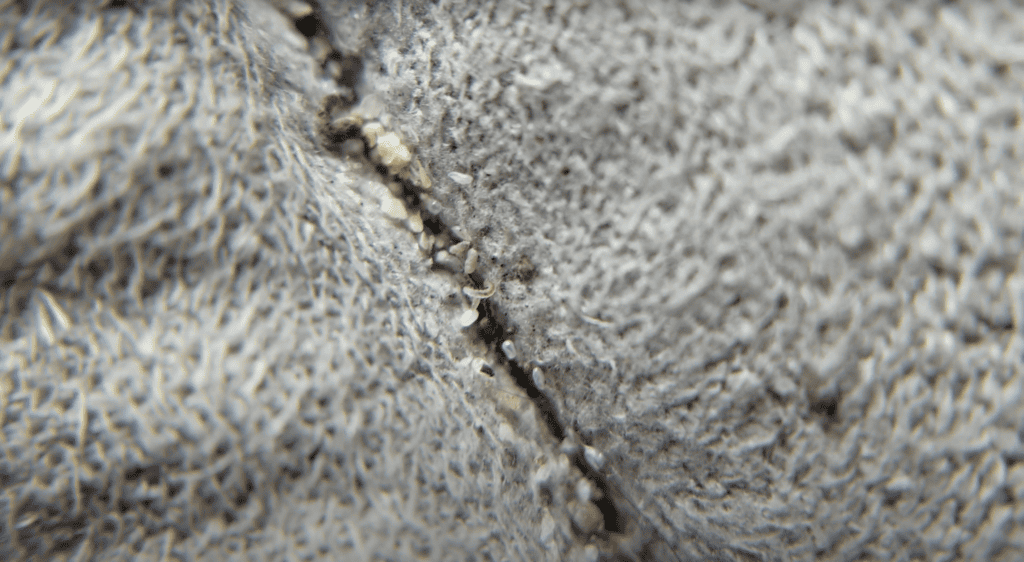
To use borax for killing fleas in carpets, follow these steps:
- Begin by thoroughly vacuuming the entire carpet to remove visible dirt, pet hair, and some of the fleas.
- Sprinkle a generous amount of borax powder evenly across the carpet. You can use a broom or brush to help spread the borax across the surface.
- Gently work the borax into the carpet fibers to ensure it reaches the fleas hiding in deeper layers. Be careful not to damage the carpet fibers while doing this.
- Allow the borax to sit on the carpet for at least 24-48 hours. This provides enough time for the substance to take effect and kill the fleas.
- After the specified period, thoroughly vacuum the carpet again to remove the borax, as well as the dead fleas and their debris.
- Dispose of the vacuum cleaner bag or empty the container outside to prevent fleas from re-infesting the area.
Repeat the treatment if necessary to completely eradicate the infestation.
How long to leave borax on carpet for fleas?
Borax should be left on the carpet for at least 24-48 hours to give it enough time to effectively kill fleas. However, the duration may vary based on the severity of the infestation or the specific environment.
Can you use borax to kill fleas on hardwood floors? How?
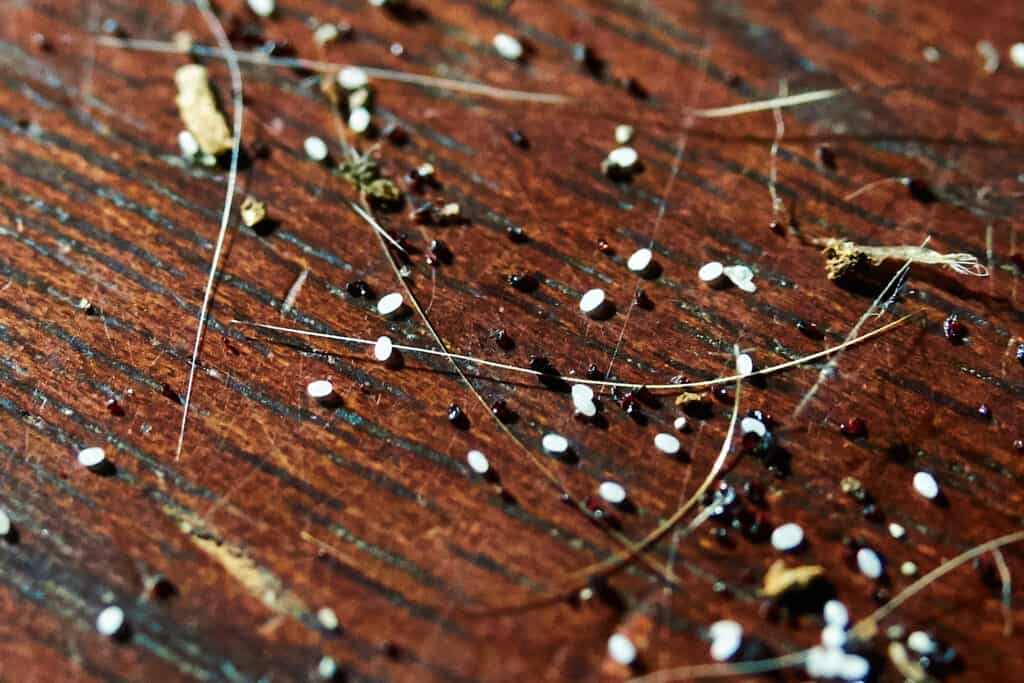
Yes, borax can be used to kill fleas on hardwood floors. Here’s how:
- Sweep or vacuum the hardwood floor to remove dirt and debris.
- Sprinkle a thin layer of borax powder evenly across the floor, focusing on areas where fleas are most likely to hide, such as corners, baseboards, or under furniture.
- Use a soft broom or mop to spread the borax and gently work it into cracks and crevices of the floor.
- Allow the borax to sit for at least 24 hours, giving it time to kill the fleas.
- Afterward, sweep or vacuum the floor thoroughly to remove the borax and dead fleas.
What’s the role of borax in flea control within houses?
Borax plays a crucial role in flea control within houses by directly killing fleas in different life stages and reducing the overall flea population. Its effectiveness in dehydrating fleas makes it a valuable tool for homeowners struggling with flea infestations. Borax can be applied to various surfaces, such as carpets, hardwood floors, and upholstered furniture, to effectively eliminate fleas in a residential setting.
Can borax be used for fleas in the yard? If so, how?

Borax is not typically recommended for outdoor flea control. While it can kill fleas in a yard, its effectiveness is greatly reduced in outdoor settings due to factors like:
- Rain, wind, and sunlight can wash away or degrade the borax.
- Excessive use of borax in the yard can harm plants and the surrounding environment.
For outdoor flea control, consider using alternative treatments like diatomaceous earth, insecticides, or natural remedies like nematodes.
What are the Various Products and Varieties of Borax Used in Flea Control?
What kind of borax kills fleas?
The most common and effective type of borax used for killing fleas is pure borax powder, also known as sodium borate. This natural mineral compound can be found in various commercial cleaning products or as a standalone product in the laundry or cleaning aisle at most grocery stores.
What is the use of 20 Mule Team Borax for fleas?
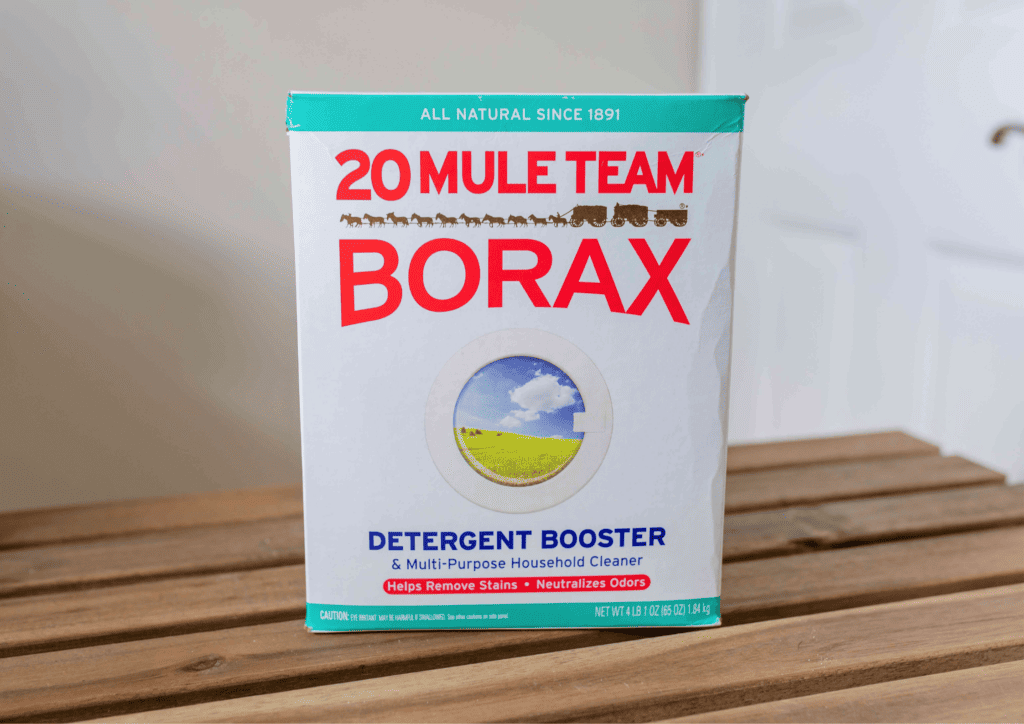
20 Mule Team Borax is a popular brand of pure borax powder that is commonly used for controlling fleas. It can be sprinkled directly onto carpets, hardwood floors, or other infested areas, where it will work to dehydrate and kill fleas in different life stages. The product is also known for its versatile uses, including household cleaning and laundry applications.
How does borax powder function against fleas?
Borax powder functions against fleas by penetrating their outer exoskeleton and absorbing the essential oils needed for moisture retention. This process dehydrates the fleas, eventually leading to their death. Borax powder is particularly effective against adult fleas and larvae, though it may be less effective at targeting flea eggs.
What is the role of borax flea spray and borax flea treatment?
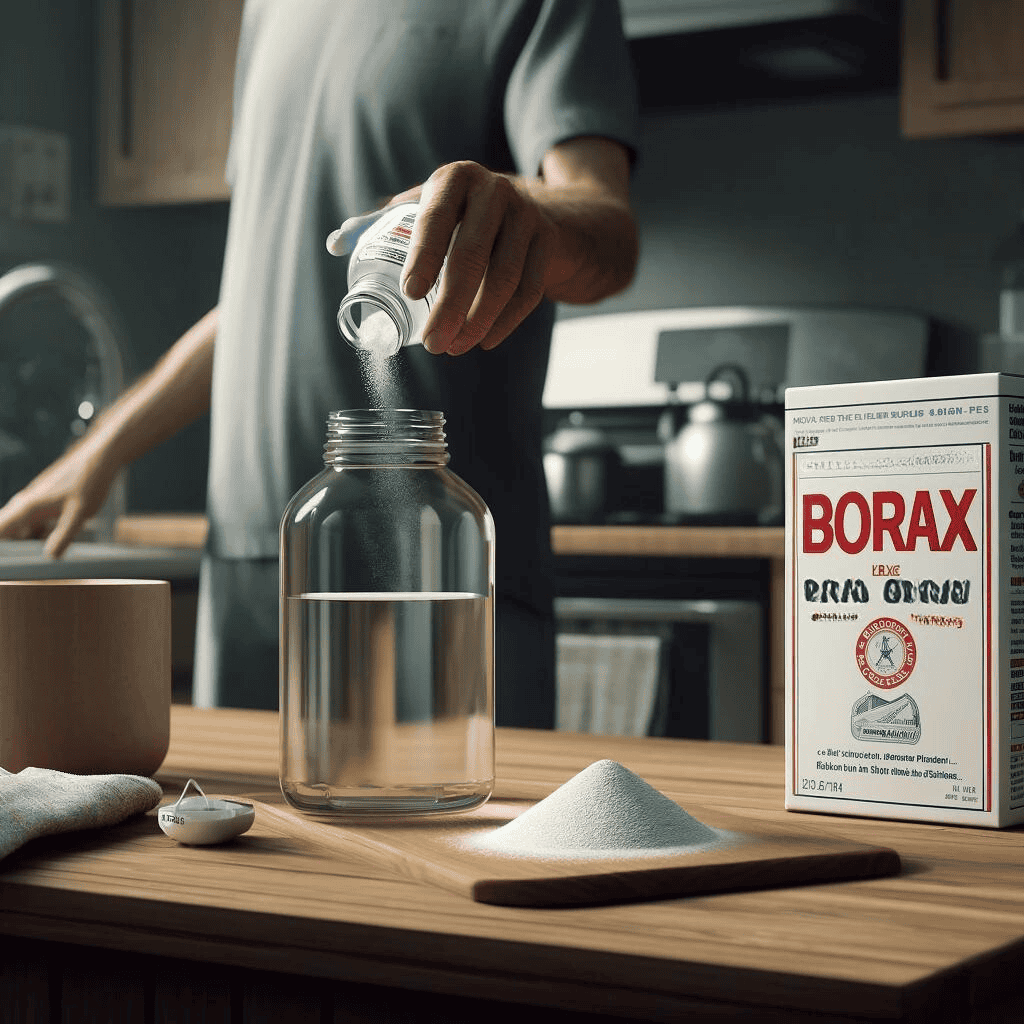
Borax flea sprays or treatments refer to products that use borax as an active ingredient to kill or repel fleas. Borax flea spray can be applied directly to infested surfaces or even used as a topical treatment on pets in some instances. However, always check the specific product instructions and consult with a veterinarian before applying any flea treatment on your pets directly.
Can you prepare a borax flea killer recipe at home? How?
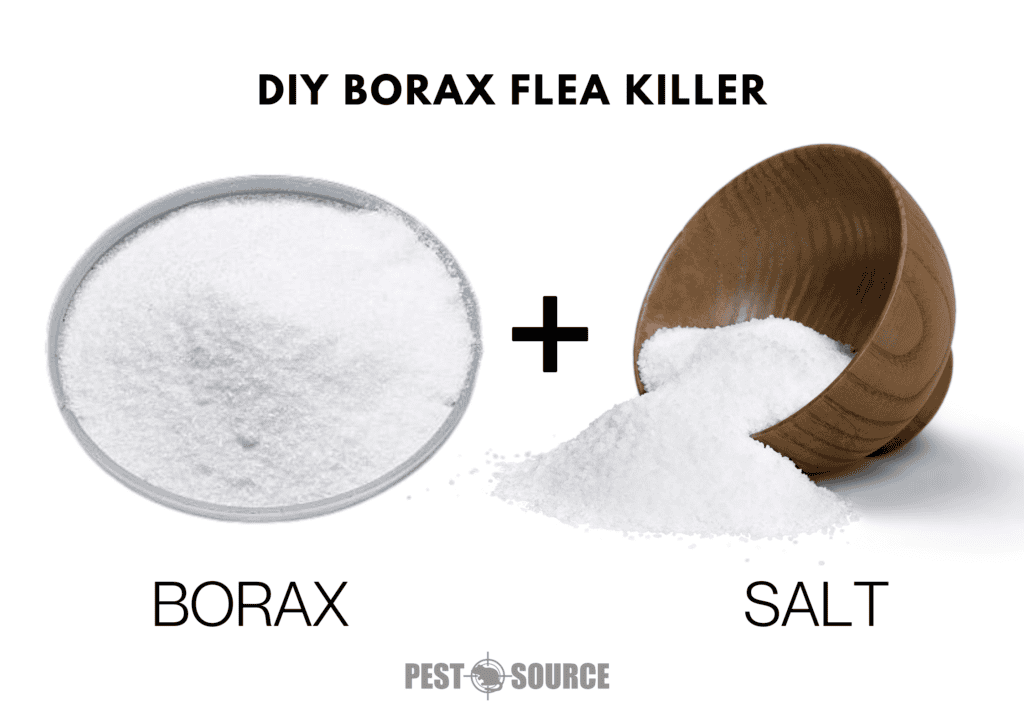
Yes, it’s possible to prepare a borax-based flea killer recipe at home. One simple recipe involves combining equal parts borax powder and table salt. The salt adds to the desiccating effects of borax, helping to eliminate fleas more effectively. To prepare and use this mixture:
- Combine equal parts of borax powder and table salt in a container.
- Mix the ingredients well to form a fine, uniform powder.
- Apply the mixture to infested areas like carpets, hardwood floors, and furniture by sprinkling it evenly across the surface.
- Allow the mixture to sit for at least 24-48 hours.
- Vacuum or sweep the treated area thoroughly to remove the borax-salt mixture and dead fleas.
Always take precautions when using borax-based flea treatments, especially around children and pets.
Borax, Boric Acid, Salt, and Diatomaceous Earth in Flea Control?
Does boric acid kill fleas? How does it compare with borax?
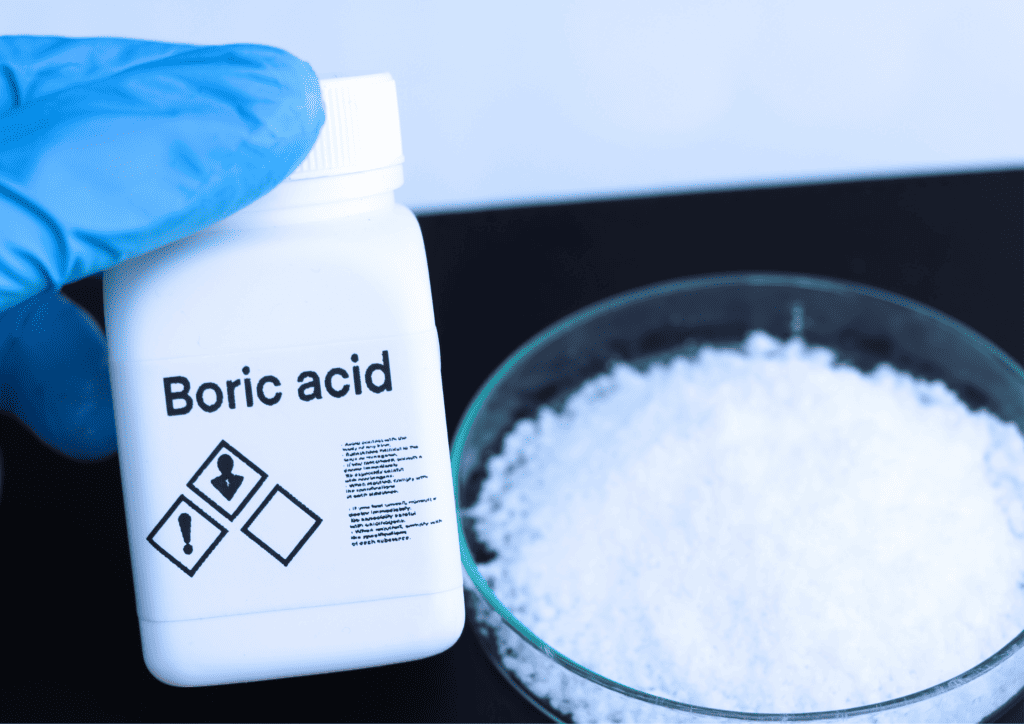
Yes, boric acid kills fleas. Like borax, boric acid is a naturally occurring compound that dehydrates fleas by absorbing the oils in their exoskeleton, leading to death. The flea control effectiveness of boric acid and borax is relatively similar. However, they have different chemical structures, and boric acid tends to be considered slightly more toxic to humans and pets, whereas borax is often promoted as a gentler alternative.
Can you mix boric acid with water to kill fleas?
Boric acid is generally used in its powder form for flea control, as mixing it with water may limit its effectiveness. When mixed with water, boric acid may not adhere as well to the flea’s exoskeleton, reducing its desiccating effect. Using powders like boric acid or borax directly on infested surfaces allows for better contact with fleas, ultimately improving their efficiency.
How effective are the salt and borax or borax and salt combinations in killing fleas?
A combination of salt and borax can enhance the overall effectiveness of flea control. Both substances work through a similar mechanism of dehydrating fleas by absorbing the essential oils in their exoskeleton. When combined, they can create a stronger desiccating effect, making it more difficult for fleas to survive. However, it is important to use the appropriate amounts of each ingredient and follow the proper application process to ensure success.
Borax vs. diatomaceous earth for fleas: Which is more effective?
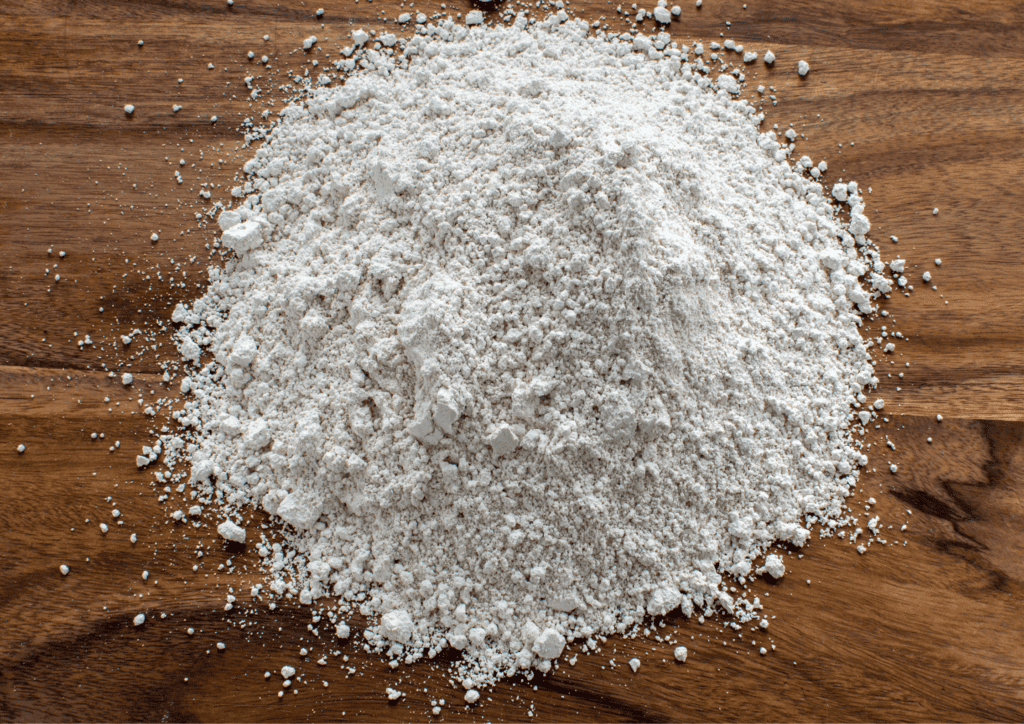
When choosing between borax and diatomaceous earth (DE) for flea control, both substances have their advantages and can be effective in different scenarios.
- Borax is a popular option for controlling fleas in indoor environments like carpets and hardwood floors. It effectively kills adult fleas and larvae but may not provide a complete solution against flea eggs.
- Diatomaceous earth, on the other hand, is a natural, fossilized algae powder that can be used both indoors and outdoors. DE kills fleas by causing physical damage to their exoskeleton, leading to dehydration and death. It is effective against all life stages of fleas, including eggs, making it a more comprehensive solution for flea control.
Both borax and diatomaceous earth can be effective against fleas when used correctly, and the choice often comes down to personal preferences, the specific situation, and the environment in which they will be used.
Is Borax Safe for Pets during Flea Treatment?

Is borax safe for dogs and cats during flea treatment?
Borax is generally considered safe for use around pets when applied correctly and in appropriate quantities. However, it is important to exercise caution while using borax for flea treatment in the presence of dogs and cats. Ingesting or inhaling large amounts of borax can cause potential health risks to pets, including vomiting, diarrhea, and respiratory distress.
Will borax hurt dogs or cats?
Borax can hurt dogs or cats if they are exposed to excessive amounts or they accidentally ingest it. To minimize the risk of harm, ensure that your pets are kept away from treated areas until the borax application is complete and the area has been thoroughly cleaned.
How to use borax for fleas on dogs and cats safely?

Borax should not be directly applied to your pets for flea treatment as it may cause skin irritation or be ingested during self-grooming. Instead, focus on treating the environment where your pets spend time, such as carpets, furniture, and pet bedding. Keep your pets away from these treated areas until they are cleaned and free of borax residue. Consult with a veterinarian to determine the best flea treatment options for your pets directly.
Is borax on carpet safe for pets?

Borax on carpet is generally safe for pets when used as directed. However, take precautions to keep pets away from treated areas until the borax has been in contact with the carpet for the recommended time and has been thoroughly vacuumed up to remove residue. This will minimize the risk of your pet ingesting or inhaling borax, preventing potential health issues.
Are there any precautions to take while using borax for flea control around pets?
When using borax for flea control around pets, consider the following precautions:
| Precaution | Description | Recommendation |
|---|---|---|
| Keep Pets Away from Treated Areas | Borax can be harmful if ingested or inhaled by pets. | Restrict access to treated areas until the borax is cleaned up. |
| Avoid Direct Application on Pets | Applying borax directly to pets can lead to skin irritation or ingestion. | Use pet-specific flea treatments recommended by a veterinarian. |
| Thorough Cleaning After Application | Residual borax can pose risks to pets. | Vacuum treated areas thoroughly to remove all traces of borax. |
| Monitor for Adverse Reactions | Pets may react differently to borax-treated environments. | Watch for signs of discomfort or illness and consult a vet if concerns arise. |
User Experience and Review-Based Insights: Does Borax Really Work for Flea Control?
What are some reviews about using borax for fleas?
Many users have shared positive experiences and reviews about using borax for flea control. Customers often praise borax for its effectiveness in eliminating fleas, affordability, and ease of use. However, some users may encounter challenges if the borax application is not thorough or if the infestation is particularly severe. Overall, the majority of reviews indicate that borax is an effective solution for flea control when used correctly.
Where can I buy borax for fleas?

Borax can be found at most grocery stores, big-box retailers, and online marketplaces like Amazon. It is usually located in the cleaning or laundry aisle. Look for well-known brands, such as 20 Mule Team Borax, when shopping for borax specifically for flea control. Ensure that you are buying pure borax powder and not a product that contains additional chemicals that may be harmful to pets or humans.
What are the general experiences of people using borax to get rid of fleas?
The general experiences of people using borax to get rid of fleas are largely positive. Many users report successful results in controlling and eliminating flea infestations from their homes. They often emphasize the importance of following proper application methods and being diligent in vacuuming and cleaning the treated areas.
However, borax may not always work in every situation. Factors such as the severity of the infestation, ineffective application, or resistant flea populations can impact the outcome. In such cases, users may need to explore alternative treatments or consult with professional pest control services to address flea infestations.
In summary, most people who use borax for flea control have experienced positive results, but it is essential to follow the correct procedures and consider environmental factors to maximize its effectiveness.
Conclusion: Is Borax a Good Solution for Flea Control?
Overall, is borax effective for fleas?
Overall, borax is an effective solution for flea control in a variety of settings, such as carpets, hardwood floors, and furniture. Its desiccating properties make borax highly efficient in killing adult fleas and larvae, leading to a significant reduction in the flea population. However, it may be less effective against flea eggs, so using borax in combination with other flea control methods can increase its efficiency.
What precautions should one keep in mind while using borax for fleas?
When using borax for flea control, it is essential to keep the following precautions in mind:
- Always follow the proper application methods and dosage to maximize effectiveness and prevent potential harm.
- Keep children and pets away from treated areas until the borax has been thoroughly cleaned.
- Do not apply borax directly onto pets, as it may cause irritation or harm if ingested.
- Consult with a veterinarian for safe flea treatment options for your pets.
- Wear protective gloves and a mask while applying borax to reduce the risk of skin irritation or respiratory issues.
Based on the information and reviews, would borax be recommended for flea control?
Based on the information and user reviews, borax is a recommended solution for flea control in many situations. Its efficacy, affordability, and ease of use make borax a practical and valuable option for homeowners dealing with flea infestations. However, it is crucial to follow proper usage guidelines and take necessary precautions to ensure the safety of pets and humans. Additionally, consider using borax in combination with other flea control methods or consulting with a professional pest control expert for the best results.

